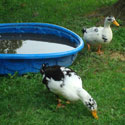
Ducks have been called the New Chickens, in honor of their increasing popularity. But the first time-duck owner who attempts to manage ducks like chickens can be in for an unpleasant surprise. The two main issues are that ducks like it wet while chickens like it dry, and ducks don’t have the same sensible sleeping habits as chickens.
For starters, raising ducks and chickens in the same brooder is a recipe for disaster. Ducklings gravitate toward water like… well… like ducks. They must drink more to remain healthy and they splash a lot while playing in the drinker. They also drop feed from their bills into the drinker, sludging up the water faster than chicks do. Ducklings are therefore notorious for quickly turning their brooder, and themselves, into a soggy mess.
To keep your dry-loving chicks healthy, brood ducklings separately from the chicks right from the start. And if you use a cardboard box as a brooder, have plenty of extra boxes on hand. You’ll have to replace the soaking wet duckling box a lot more often than the chick box needs replacement. To prevent chilling and sickness, replace any brooder box and bedding as soon as the bottom gets damp, usually every two to three days for chicks, more often for ducks.
As ducklings grow, their fondness for water increases. If ducks have access to the chicken coop, keeping the chicken waterer outside the coop will help prevent an unhealthful wet mess inside the coop. Nipple drinkers that are so popular for chickens are not suitable for ducks, as they need to be able to submerge their heads under water. So if you use nipple drinkers for your chickens, provide a deeper source of water for your ducks, such as a trough drinker.
If ducks share the chickens’ feeder, distance the feeder from the drinker to reduce the amount of moisture ducks drip into the feed. With the drinker stationed outside the coop, do not put the feeder inside the coop, as chickens and ducks both need water to wash down their feed and can choke if confined indoors with feed but no water.
Some poultry owners house ducks in the same coop as chickens, closing them up together overnight to protect them from predators. That’s not fair to the chickens, which like to sleep the night through. Ducks, on the other hand, alternate cat naps with play and can make enough fuss to keep the chickens from getting as much rest as they need.
A better plan is to provide separate shelters for the ducks and the chickens. Since ducks don’t perch, like chickens do, the duck shelter can be smaller than the chicken coop. All that’s needed is a roof, some soft bedding, and a few nest boxes for the female ducks to lay their eggs in. If your run isn’t predator proof, you’ll need to close up the ducks at night, just like you would close up the chickens. However, training ducks to go into their shelter for lock-up is not as easy as with chickens. At bedtime, feeding them a little treat at the shelter doorway can make it easier to herd the ducks inside.
Ducks don’t absolutely need water for swimming, but they do love to splash and play in water, and it helps them keep clean. Besides, it’s fun to watch ducks enjoying a rousing good swim. If you provide a small pond or wading pool for your ducks, place it some distance from your chickens’ favorite spots to prevent unhealthful puddles from forming where the chickens hang out. Don’t be surprised, though, if a chicken or two wanders over to the duck pond for a sip of water, or to cool off on a hot day by standing in the water. And the occasional chicken might even take a notion to jump into the water for a refreshing swim.
Given proper management and due consideration for their differing lifestyles and habits, ducks and chickens can, and do, get along well together. The more space you have available for providing separate housing, for keeping feeders and drinkers outdoors, and for establishing a swimming hole away from the chickens’ hangout, the more successful your duck-and-chicken venture will be.
And that’s today’s news from the Cackle Coop.
Gail Damerow is the editor and principal author of Backyard Homestead Guide to Raising Farm Animals


I have read that Drakes will Force themselves on chickens trying to mate with them and the chicken would end up dying is this true? Would the answer be to have the right drake to duck ratio? And rooster to chicken ratio in the same large space?
Useful post with so much information. It has cleared my notion about raising ducks and chiks together. Thank you for sharing.
I put some duck eggs from a neighbor under my broody hen (no rooster so none of her eggs were fertilized). Now I have three ducklings and I’m wondering if they are eating enough. At day two should they be hungry? They won’t eat corn and I made a little picadillonof cucumbers, beets, carrots and cabbage with banana and some goat milk yogurt. What do you recommend feeding newly hatched ducklings?